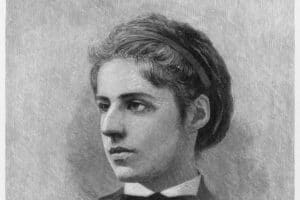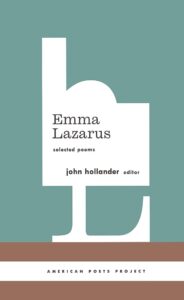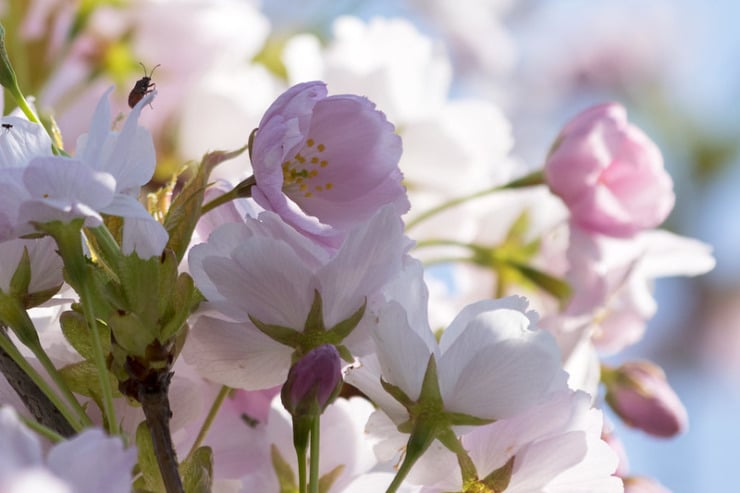
Best known for a patriotic poem, Emma Lazarus increasingly turned to poems about her Jewish faith and heritage.
Emma Lazarus (1849-1887) was a remarkable poet and writer by almost any definition. Born to a wealthy family in New York City, she saw her first poetry collection privately published by her father in 1866 and her first commercially published collection in 1867. She published translations of German poets. She published a second poetry collection a novel, and a play.

Emma Lazarus
In the 1880s, following the assassination of Tsar Alexander II, a period of pogroms against the Jewish population became official policy in Russia (the same pogroms led the parents of poet Charles Reznikoff to emigrate to America). Lazarus, mindful of her own Jewish heritage, turned to poetry and prose to protest the persecutions in Russia as well as the struggles of Jewish emigrants and citizens in the United States, articulating what she saw as the necessity of a Jewish homeland in Palestine.
It is one poem she is famous for, one that is unconnected to her writing and poetry about Jewish faith, heritage, and people. She was commissioned in 1883 to write a fundraising poem for the pedestal of what would become known as the Statue of Liberty in New York City Harbor. Her sonnet, “The New Colossus,” was eventually engraved on the statue’s base and in popular imagination and culture became the words best representing the United States to the rest of the world. The poem’s title suggests a comparison with one of the wonders of the ancient world, the Colossus of Rhodes.
An example of her poems, selected from both published volumes and uncollected work, is this one, entitled “1492,” a sonnet not about Columbus finding what came to be known as America but about something else that happened that same year, also involving the kingdom of Spain. That was the expulsion of the Jews.
1492

Didst weep when Spain cast forth with flaming sword,
The children of the prophets of the Lord,
Prince, priest, and people, spurned by zealot hate.
Hounded from sea to sea, from state to state,
The West refused them, and the East abhorred.
No anchorage the known world could afford,
Close-locked was every port, barred every gate.
Then smiling, thou unveil’dst, O two-faced year,
A virgin world where doors of sunset part,
Saying, “Ho, all who weary, enter here!
There falls each ancient barrier that the art
Of race or creed or rank devised, to rear
Grim bulwarked hatred between heart and heart!”
Lazarus also wrote of musicians and art, heroes and soldier of the Civil War, her travels to Europe, and celebrations of people like Florence Nightingale. But she died at a fairly young age, only 38, and she assigned her sister to be her literary executor. Unfortunately for much of Lazarus’s work, the sister had converted to Anglicanism, and she quietly suppressed Lazarus’s poetry and other writings about Jewish faith and heritage.
Under the imprint of Library of America, poet and critic John Hollander (1929-2013) served as editor of Selected Poems, first published in 2005. The volume demonstrates that Lazarus was far more than the single poem she’s known for – a fine poet, a writer, a polemicist, and a champion of the persecuted and downtrodden, and especially her fellow Jews.
Photo by Paul Van de Velde, Creative Commons, via Flickr. Post by Glynn Young.
How to Read a Poem uses images like the mouse, the hive, the switch (from the Billy Collins poem)—to guide readers into new ways of understanding poems. Anthology included.
“I require all our incoming poetry students—in the MFA I direct—to buy and read this book.”
—Jeanetta Calhoun Mish
- Poets and Poems: Sandra Marchetti and “Diorama” - April 24, 2025
- Poets and Poems: Christina Cook and “Roaming the Labyrinth” - April 22, 2025
- Longfellow’s “Paul Revere’s Ride”: Creating a National Legend - April 17, 2025


Bethany says
Oh, how interesting. Thank you for sharing all this. I’m finally reading her “Statue of Liberty” poem, in full, for the first time, as an adult. How inspiring and humbling.